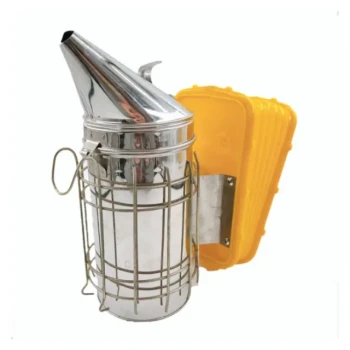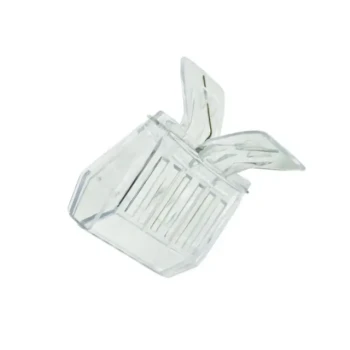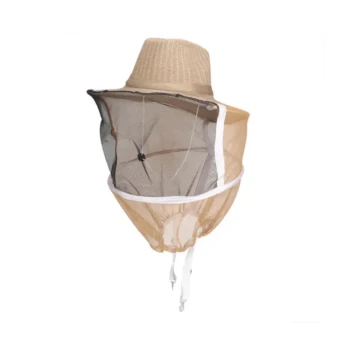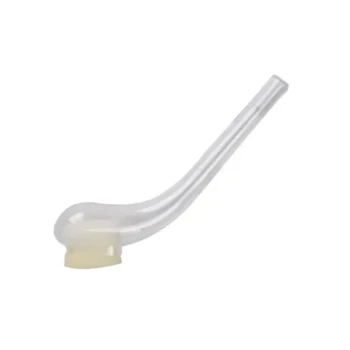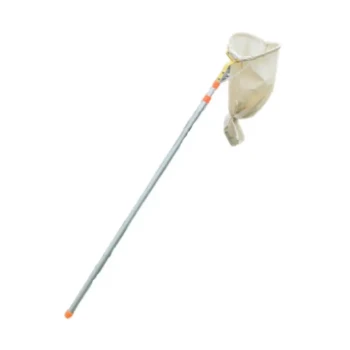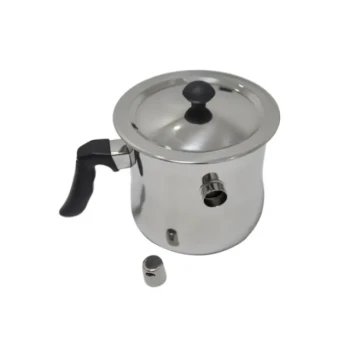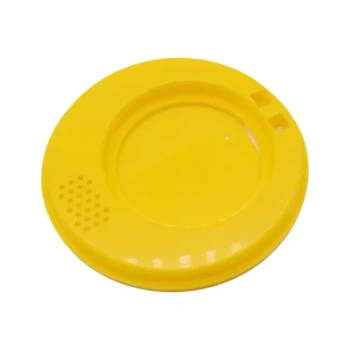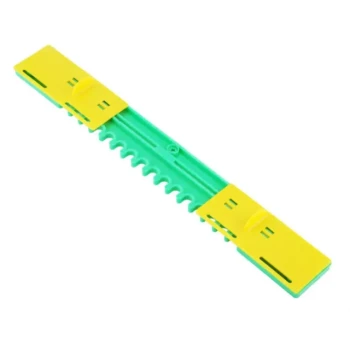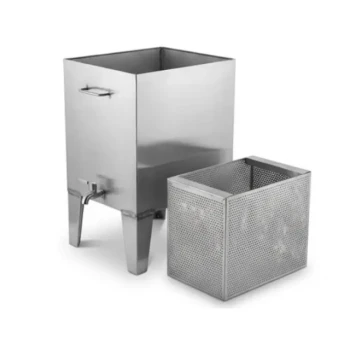The primary caution is that not all-natural pollen or the beebread made from it is nutritionally adequate for a honey bee colony. Bees can mistakenly collect materials like fungal rust spores that offer little to no nutritional value, which can be more harmful to the hive's health than having no forage at all.
The quality of natural pollen is highly variable and cannot always be trusted to support a thriving colony. A beekeeper's role is to identify periods of nutritional risk and be prepared to provide a high-quality substitute to prevent a decline in the hive's health and productivity.
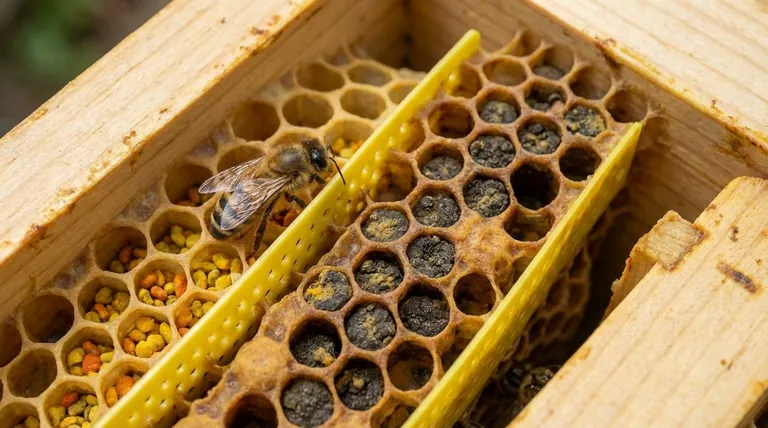
Why Not All Pollen Is Created Equal
Bees rely on pollen as their sole source of protein, lipids, vitamins, and minerals. However, the assumption that any available pollen is good pollen is a critical misunderstanding.
The Spectrum of Nutritional Value
Pollen quality varies dramatically between different plant species. Some pollens, like those from clover and willow, are rich in the proteins and amino acids essential for brood rearing and adult bee health.
Others, such as pollen from pine or corn, are nutritionally poor. A colony subsisting on these low-grade sources will struggle to raise healthy young and maintain a strong population.
The Critical Role of Protein
Protein is the most important nutrient in pollen. It is the fundamental building block for raising new bees (brood) and for producing royal jelly to feed the queen and young larvae.
A lack of high-quality protein leads directly to a smaller, weaker workforce and can severely limit the queen's egg-laying rate.
The Hidden Danger: When Forage Becomes a Liability
In some situations, what bees bring back to the hive is not just low-quality, but actively detrimental. This is the core of the caution regarding natural forage.
Fungal Spores: The Deceptive Forage
Bees can be tricked into collecting non-pollen substances that resemble pollen grains, with fungal rust spores being a prime example. These spores are often the same size, shape, and color as viable pollen.
The bees expend precious energy and flight time to collect and store this material as beebread, but it contains virtually none of the protein or lipids required for survival.
'Worse Than Nothing': The True Cost
When a colony fills its beebread stores with useless fungal spores, it creates a dual crisis. First, the bees have wasted energy on a fruitless task. Second, the hive is now operating under the false assumption that it has adequate food reserves.
This can lead to a sudden population crash as the colony attempts to raise brood with no nutritional resources to support them. The worthless beebread occupies cells that could have held genuine, life-sustaining pollen.
Identifying Periods of Nutritional Stress
Beekeepers must be most vigilant during specific times:
- Early Spring: Before diverse floral sources are blooming.
- Late Summer/Pollen Dearth: When hot, dry weather reduces available forage.
- Monoculture-Dominant Areas: In agricultural zones where bees may only have access to one or two poor-quality pollen sources.
When to Intervene with a Pollen Substitute
Understanding the risks of poor natural pollen allows a beekeeper to use pollen substitutes strategically and effectively.
What is a Pollen Substitute?
A pollen substitute is a commercially or homemade mixture formulated to provide the complete nutritional profile bees require. These feeds typically use ingredients like soy flour, brewer's yeast, and other protein sources.
The Goal: Supplement, Not Replace
For most beekeepers, the goal is not to replace natural pollen entirely. Instead, the substitute is a tool used to bridge a nutritional gap.
Feeding a substitute ensures the colony has the resources it needs to continue raising brood and maintain its population during periods when natural forage is scarce or of poor quality. This is a proactive measure to prevent stress and decline.
Making the Right Nutritional Decision for Your Colony
Your decision to supplement should be based on observation and an understanding of your local environment.
- If your primary focus is colony buildup for pollination or honey flow: Provide a pollen substitute 1-2 brood cycles before the target event to ensure a massive, healthy workforce.
- If your primary focus is surviving a pollen dearth: Feed a substitute as soon as you notice a lack of incoming natural pollen to prevent a pause in brood rearing and a subsequent population drop.
- If your primary focus is colony health in a high-risk area: Routinely check the color and diversity of incoming pollen and be prepared to supplement if you notice bees returning with uniformly colored, low-quality pollen or if brood production declines unexpectedly.
Proactive nutritional management is a cornerstone of responsible and successful beekeeping.
Summary Table:
| Pollen Type | Nutritional Value | Risk to Colony |
|---|---|---|
| High-Quality (e.g., Clover) | Rich in protein, lipids, vitamins | Low risk; supports healthy brood |
| Low-Quality (e.g., Pine) | Poor protein content | Weakens population, reduces brood |
| Fungal Spores (Deceptive) | Virtually no nutritional value | High risk; can lead to colony collapse |
Ensure your apiary thrives with reliable nutrition. HONESTBEE supplies commercial apiaries and beekeeping equipment distributors with high-quality pollen substitutes and feeding equipment. Don't let poor forage compromise your colony's health—contact us today to discuss wholesale solutions tailored to your operation!
Visual Guide
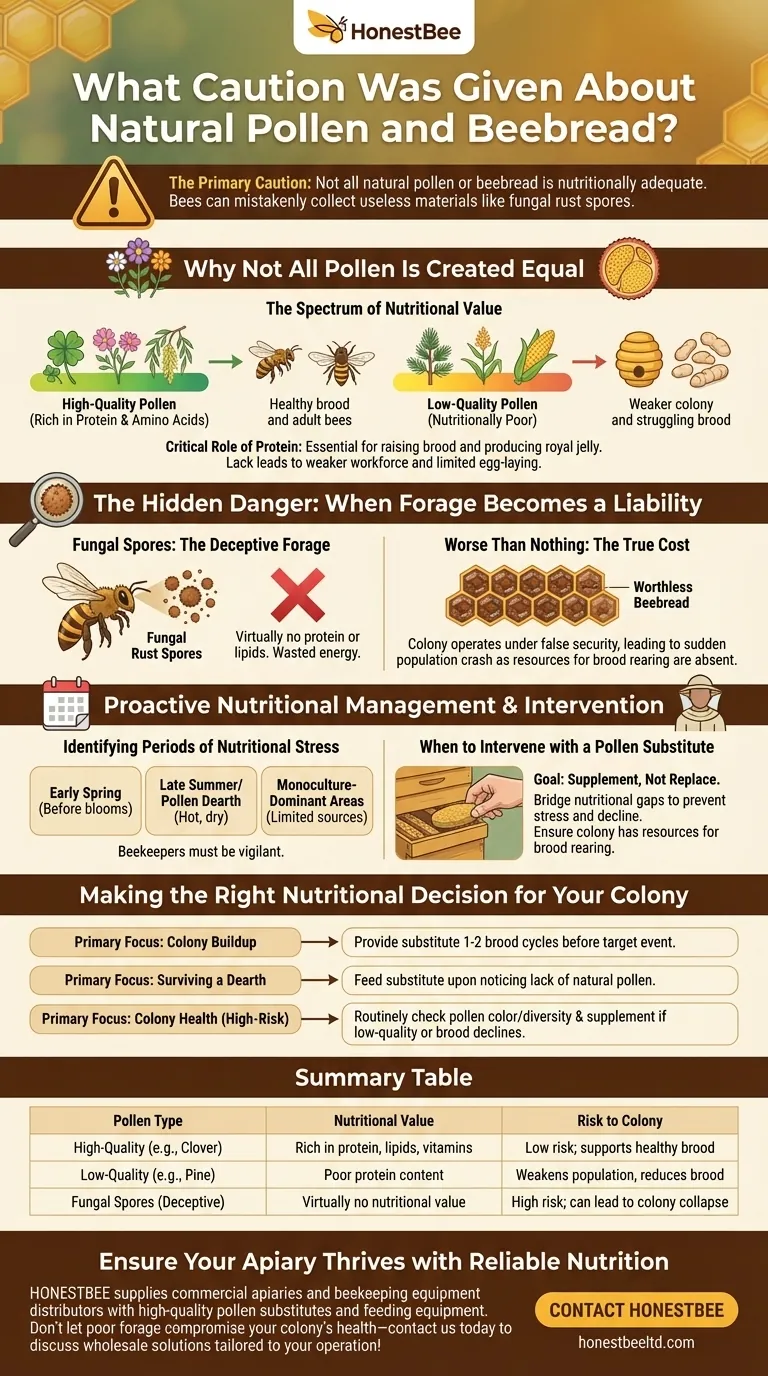
Related Products
- Plastic Bee Pollen Trap Strips Comb Catcher Collector
- Economy Galvanized Beekeeping Honey Bee Smoker for Wholesale
- Professional Bee Smoker with Elongated Spout and Durable Bellows for Beekeeping
- Professional Spring-Action Queen Catcher Clip
- Beekeeper Cowboy Hat and Veil for Beekeeping
People Also Ask
- What is the function of industrial-grade pollen traps in the production of diverse bee products? Drive Apiary Growth
- How should a top pollen trap be introduced to a bee colony? Expert Guide to Stress-Free Installation
- What are the specific functions of an internal wood or metal grid pollen trap within a beehive? Boost Apiary Efficiency
- What function do pollen traps serve in quantitative collection? Boost Your Apiary's Data & Production Efficiency
- What role do professional Pollen Traps play? Maximize High-Purity Harvests and Optimize Beekeeping Efficiency


